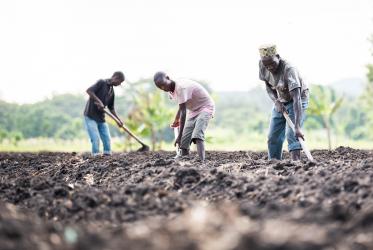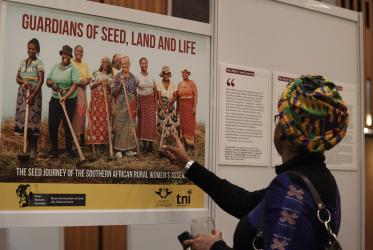Dr Manoj Kurian, coordinator of the World Council of Churches Ecumenical Advocacy Alliance, co-moderated the 2 September online consultation.
The meeting sought to promote engagement and partnerships between faith-based organizations, indigenous peoples, governments, multilateral organizations, and corporations for more sustainable and just food systems.
Andrew Schwartz, Center for Earth Ethics operations director, as co-moderator, opened the session in which different speakers noted the "richness" of contributions.
"The suffering the world is experiencing is the direct and predicted result of an industrialized system of consumption, extraction and destruction built upon fossil fuels," said Schwartz.
"We're taking more than the Earth can give. Too much of the last century has been dictated by the selfish ambition of individuals of the global north of corporations all in the pursuit of more money and more power."
Food fairness in action
Rev. Andrew Morley, World Vision International president, ordained in the Anglican Church, said, "Food fairness is love in action, truly loving our neighbour. Nutritious food is vital for children to achieve their God-given potential.”
He said in the Democratic Republic of Congo, the World Food Programme and World Vision as a team, provide hot meals to every child, each day, noting that many children in the country only get a decent meal at school.
"Our food systems are broken. And they need to be fixed. And God is calling us to fix them," said Morley. "COVID-19 has only made matters worse. We're now facing a global hunger crisis with 41 million people starving, and 150 million people will be pushed into poverty this year because of COVID. And schools were closed almost for an entire year for 168 million students around the world."
Kurian asked, "What can be done to better the collaboration between faith and non-faith players, especially when there is such unequal power?"
Karenna Gore, Center for Earth Ethics founder and director, answered, "There are many roles that faith communities play. There are the prophetic, pastoral and practical roles, where the prophetic is telling the truth.”
Intertwined with cultures
She said it is critical for policymakers to have serious partnerships with faith communities “that are really shining a light on the reality of the food systems and how it's intertwined with cultures and with health around the world."
Gore said, "there are communities that are very much embedded in where there are experiences of trauma from extreme weather events" such as drought and famine. There "faith actors are first responders, often to the calamities of disaster and famine."
Various groups held conversations, and Rev. Matthew Ross, WCC programme executive for Diakonia and Capacity Building, highlighted some points from one of them.
He referred to the goals for the transformation of food systems approaching the year 2030.
It had been mentioned there were vital areas such as giving a voice to the voiceless, to women and, young indigenous minorities. "Food as a human right rather than a commodity, and dignity and value to those producing food," was discussed, said Ross.
They included, “food as being a necessity, rather than a privilege, and access to natural foods must not be overpriced. As a commodity, women's voices and food production and distribution are essential. Partnering with communities is essential."
Via video, Rev. Dr Malayil Sabu Koshy Cherian from South India said before he became bishop in January, his parish had a vast barren land area.
"I led the transformation of the barren land into a fertile one, thus producing around 50 kilograms of vegetables per day. The produce is owned by the congregation, and we gave the vegetables to the community kitchens free of cost to feed the community's most vulnerable members during the COVID pandemic."
He said, "Yes, I am a farmer bishop, and with my community, we lift up our common values of sharing, caring, and mutual solidarity through farming."






